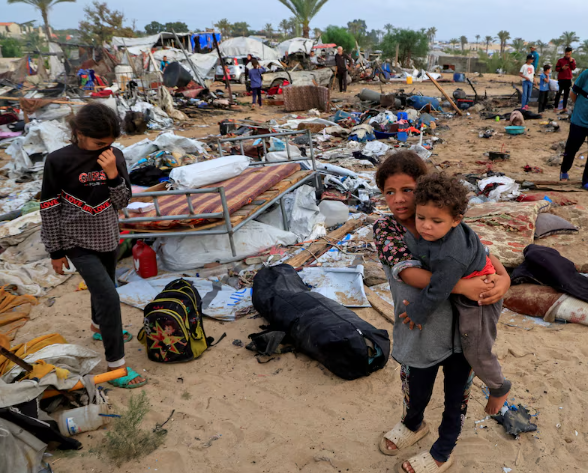
Israel Airstrikes Kill at Least 100 in Gaza Amid Stalled Ceasefire Talks

In a devastating escalation of the ongoing conflict, Israeli airstrikes overnight have killed at least 100 Palestinians across the Gaza Strip, according to local health authorities. The strikes, which targeted various areas throughout the enclave, come as mediators continue to seek a ceasefire between Israel and Hamas with little progress.
The bombardment, described by the Gaza health ministry spokesperson Khalil Al-Deqran as an act of unparalleled brutality, has resulted in the loss of entire families. "We have at least 100 martyrs since overnight. Complete families were wiped off the civil registration record by Israeli bombardment," Al-Deqran stated, emphasizing the magnitude of the strikes. The Israeli military has yet to comment on the latest offensive, which follows a series of intensified attacks since Thursday, aimed at gaining operational control in parts of Gaza.
The humanitarian situation in Gaza has reached a critical point as Israel continues to block the entry of essential supplies, including medical aid, food, and fuel, since the start of March. This blockade, intended to pressure Hamas into releasing Israeli hostages, has left Gaza’s healthcare system on the verge of collapse. Local hospitals are overwhelmed, with staff at Shifa Hospital, the largest in Gaza, urgently calling for blood donations to cope with the influx of casualties.
Adding to the chaos, one of the Israeli airstrikes struck a tent encampment in Khan Younis, southern Gaza, killing multiple women and children. The attack set tents ablaze, displacing even more families and drawing condemnation from Hamas, who labeled it a “new brutal crime” and blamed the U.S. administration for the escalation.
Reports indicate that five journalists were among the dead, some alongside their families, as strikes targeted residential areas. Among the casualties was Zakaria Al-Sinwar, a history lecturer and brother of former Hamas chief Yehya Al-Sinwar, killed in an airstrike on his central Gaza tent. The fatalities have added to the already staggering death toll of over 53,000, as reported by Gaza health officials.
Meanwhile, indirect ceasefire negotiations mediated by Egypt and Qatar, with support from the United States, have made little headway. While unconfirmed reports suggest that Hamas leader Mohammed Sinwar may have been killed, Hamas has neither confirmed nor denied this. The Israeli Defense Ministry has also remained silent on the matter. These developments threaten to further complicate talks as both sides maintain staunch positions, with Hamas reportedly proposing the release of half its Israeli hostages in exchange for a two-month ceasefire and the freeing of Palestinian prisoners. Israel, however, continues to insist on the release of hostages without conditions.
Families of the hostages have voiced frustration, accusing the Israeli government of prioritizing political motives over the lives of captives. Einav Zangauker, whose son Matan Zangauker remains in Hamas custody, criticized Prime Minister Benjamin Netanyahu for his reluctance to agree to a ceasefire. “The Israeli government still insists on only partial deals. They are deliberately tormenting us. Bring our children back already! All 58 of them,” she wrote on social media.
The already dire conditions in Gaza are worsening by the hour. The Indonesian Hospital, one of the last partially functioning medical centers in northern Gaza, has reportedly ceased operations due to Israeli fire nearby. The Palestinian Civil Emergency Service has also warned that 75% of its ambulances are out of service because of fuel shortages, predicting a complete halt within 72 hours if the blockade persists.
International pressure is mounting on both sides to reach an agreement, but the conflict's complexity and the deep-rooted animosity continue to hinder peace efforts. As Israel aims to eliminate Hamas’ military and governmental capabilities, Palestinians continue to endure relentless airstrikes and ground offensives. The humanitarian toll is staggering, and the prospect of a long-term ceasefire remains uncertain as both parties refuse to concede ground.
With the number of displaced families rising and essential services crumbling, Gaza remains on the brink of a catastrophic humanitarian disaster. The international community's calls for restraint and negotiation are overshadowed by the ongoing violence, leaving civilians caught in the crossfire. As ceasefire talks remain stagnant, the death toll continues to climb, and the region edges closer to a prolonged and devastating conflict.


